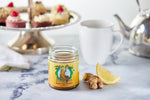What is Ginger Tea?
Ginger tea is a flavorful, stimulating beverage made from the root of the ginger plant, which is officially known as Zingiber officinale.
This root has been used in various cultures worldwide for its culinary and medicinal properties.
Ginger tea can be prepared using fresh ginger root, dried ginger pieces, or ginger powder, each method offering a unique flavor profile and health benefits.
- Fresh ginger, with its sharp and pungent flavor, is commonly grated directly into boiling water.
- Dried ginger tends to have a milder taste but is equally effective, often steeped to make a soothing cup of tea.
- For a quick fix, ginger powder can be dissolved in hot water, delivering the same spicy kick and health benefits in a convenient form.
- The inclusion of additional ingredients like honey, lemon, or cinnamon not only enhances the flavor but can also boost the tea's health benefits.
For example, adding honey provides a soothing texture and natural sweetness, making it a popular choice for evening relaxation.
Optimal Times to Drink Ginger Tea
While ginger tea is caffeine-free and can be enjoyed anytime, the timing of your tea can optimize its health benefits.
Drinking ginger tea in the morning can kickstart digestion and invigorate your senses.
However, consuming it on an empty stomach might lead to mild gastrointestinal distress for some people. To avoid potential discomforts like heartburn or abdominal pain, it's advisable to drink ginger tea between meals or in the evening.
For those looking to harness ginger tea's digestive aid properties, sipping a cup about 30 minutes before meals can help prime the digestive system. As a calming nightcap, ginger tea can contribute to a soothing pre-sleep ritual, helping to relax the mind and body.
Major Health Benefits of Drinking Ginger Tea
1. Alleviates Nausea and Vomiting
Ginger has been a go-to remedy for nausea associated with travel sickness, pregnancy, and even chemotherapy. Its natural compounds are effective in calming the stomach and can significantly reduce feelings of nausea.
2. Supports Digestive Health
Ginger stimulates saliva, bile, and gastric enzymes that aid digestion, helping to move food through the digestive tract more smoothly and reduce bloating, cramps, and indigestion.
3. Anti-inflammatory Properties
The active compounds in ginger, such as gingerols and shogaols, have potent anti-inflammatory properties, making ginger tea a great choice for reducing inflammation throughout the body.
4. Aids in Weight Management
Ginger tea can play a role in weight loss programs by enhancing thermogenesis (heat production in the body) and increasing fat breakdown.
5. Soothes Cold and Flu Symptoms
Ginger tea is a comforting remedy for relieving symptoms of the common cold and flu, such as congestion, nasal symptoms, and sore throat.
6. Neuroprotective Effects
Emerging research suggests that the antioxidants in ginger can protect against neurodegenerative diseases like Alzheimer's and Parkinson's.

How to Make Ginger Tea at Home
Ingredients:
- Fresh ginger root (1-2 inches), peeled and thinly sliced
- 4 cups of water
- Optional: Honey, lemon juice, or cinnamon stick for flavor
Instructions:
- In a medium pot, bring water to a boil.
- Add the sliced ginger and optional ingredients like a cinnamon stick.
- Reduce heat and simmer for 15-20 minutes.
- Strain the tea into a mug.
- Add honey and lemon juice to taste.
- Enjoy your homemade ginger tea!
Comparison of Ginger Tea Types
|
Type of Ginger Tea |
Preparation |
Taste Profile |
Primary Health Benefits |
|
Fresh Ginger Tea |
Steep sliced fresh ginger in hot water. |
Spicy, vibrant, very fresh |
Maximizes digestive health, anti-inflammatory |
|
Dried Ginger Tea |
Steep dried ginger pieces in hot water. |
Milder, slightly sweet |
Good for nausea, enhanced storage life |
|
Ginger Powder Tea |
Dissolve ginger powder in hot water. |
Consistent, sharp |
Convenient, quick to prepare, strong effects |
Detailed Benefits Based on the Table
Fresh Ginger Tea:
- Preparation: Fresh ginger tea involves simmering freshly sliced ginger in boiling water. This method extracts a strong, spicy flavor that is both invigorating and warming.
- Taste Profile: It has the freshest and most vibrant taste, with a pronounced spicy kick that is characteristic of fresh ginger.
- Primary Health Benefits: Fresh ginger contains the highest levels of gingerols, the active compound known for its anti-inflammatory and digestive health benefits. It's particularly effective in stimulating digestion and reducing inflammation.
Dried Ginger Tea:
- Preparation: This involves using dried ginger pieces, which are less potent than fresh ginger but still very effective. The drying process changes the chemical structure slightly, increasing levels of shogaols.
- Taste Profile: Dried ginger tea tends to have a milder, somewhat sweeter taste compared to its fresh counterpart.
- Primary Health Benefits: It's particularly beneficial for treating nausea and is easier to store and use over a longer period than fresh ginger.
Ginger Powder Tea:
- Preparation: Ginger powder tea is made by dissolving ginger powder in hot water, making it the quickest and most convenient method.
- Taste Profile: The taste is consistent and sharply spicy, offering a very concentrated flavor.
- Primary Health Benefits: While offering similar benefits to fresh and dried ginger, the powdered form is ideal for those seeking quick preparation without compromising on the health benefits.
FAQs about Ginger Tea
Yes, ginger tea can be enjoyed daily. However, moderation is key, as excessive consumption can lead to gastrointestinal upset.
Ginger tea can be safe during pregnancy but should be consumed in moderation. It's recommended to consult with a healthcare provider before starting any new dietary regimen during pregnancy.
Yes, the anti-inflammatory properties of ginger can help reduce the severity of headaches and migraines.
While generally safe, excessive consumption of ginger tea can lead to heartburn, diarrhea, and mouth irritation. It's best to start with small amounts and increase gradually.
Ginger tea is not only a warm, comforting beverage but also a powerhouse of health benefits. Whether you're looking to ease digestion, reduce inflammation, or simply enjoy a flavorful drink, ginger tea is a wonderful addition to your daily routine. Try making it at home to fully enjoy its fresh and invigorating taste!






